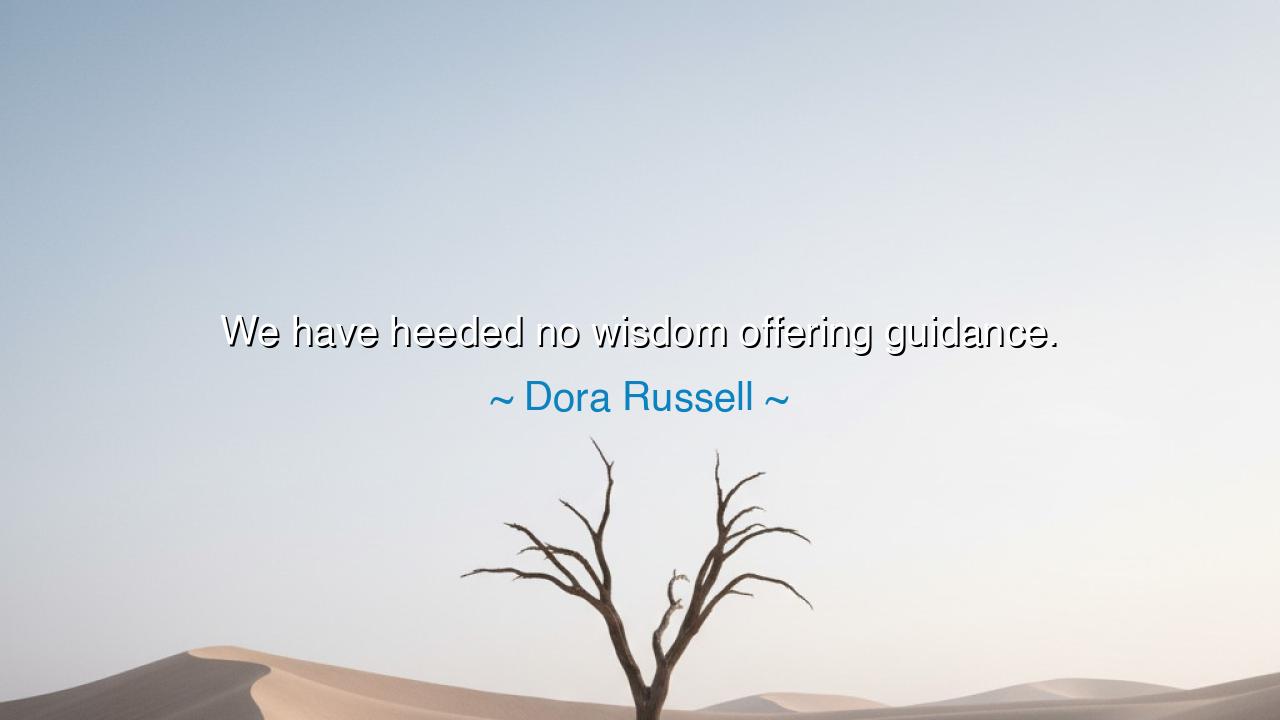
We have heeded no wisdom offering guidance.






Dora Russell, philosopher and tireless voice for peace, utters this lament: “We have heeded no wisdom offering guidance.” In these words, we hear not only her grief, but the cry of history itself—a mourning for humanity’s refusal to listen to the voices that warned of ruin. For across the ages, prophets, poets, and sages have offered counsel, yet men, deafened by pride, greed, or ambition, have turned away. Wisdom, though ever-present, remains unheeded, and the world suffers for its neglect.
The meaning of this quote is stern. Russell speaks to the tragedy of human arrogance: we believe ourselves clever, inventors of new powers and masters of our destiny, yet we trample underfoot the lessons that could save us. Guidance is not absent—it flows from the past, from philosophy, from faith, from the cries of those who suffered before us. But to refuse to heed it is to walk blindly toward destruction, repeating the same follies in new guises.
History offers many bitter examples. Consider the years before World War I, when statesmen, enthralled by empire and militarism, ignored the warnings of those who foresaw catastrophe. Voices of peace were silenced, and within weeks Europe was aflame, millions perishing in trenches and fields. This was not for lack of wisdom offering guidance, but for lack of ears willing to hear. Humanity paid the price for its arrogance, as Russell herself would later witness again in the shadow of the Second World War.
Her words are also a plea. They remind us that wisdom is not merely ancient text or idle philosophy, but a living beacon meant to guide our steps. To ignore it is not neutrality—it is to choose folly, to scorn the map and walk willingly into the abyss. The guidance of wisdom does not demand perfection, but humility: the willingness to listen, to reflect, to act with foresight instead of impulse.
Therefore, let us not be as those who “heeded no wisdom.” Let the counsel of past ages be our compass, and the lessons of suffering be our teacher. For the road of arrogance leads always to ruin, but the road of humility and reflection leads to peace. Russell’s lament can yet become a call to action—that we may finally open our ears to the guidance already given, and by doing so, build a future not haunted by the mistakes of the past.






L827.Vuong Mai Phuong lop 8A5
This quote feels like a quiet lament — a recognition that guidance has never been lacking, only our willingness to follow it. It makes me wonder whether wisdom itself has changed meaning over time. In a world obsessed with data and facts, do we even value the kind of reflective, moral wisdom that people like Dora Russell were talking about?
NNNavas Nguyen
I feel like this statement could apply to personal life as much as to civilization. How many times do we ignore good advice or intuition, only to regret it later? It’s easy to see others’ mistakes but hard to admit our own. Do you think wisdom only truly takes root after failure, when people are finally ready to listen?
TVPhan Ngoc Tuong Vy
This makes me think about how modern society treats wisdom as outdated or impractical. We chase innovation and speed, but not understanding. Maybe that’s why we’re so often lost despite our progress. Do you think true wisdom is being drowned out by noise — social media, trends, superficial knowledge — or have we simply forgotten how to recognize it when we see it?
2N22.Diem Ngoc
There’s something deeply tragic in this statement. It suggests that wisdom has always been available, but we’ve chosen not to hear it. I wonder whether this applies more to leaders or to humanity as a whole. Are we collectively guilty for turning away from insight, or is it the few in power who silence it? The moral weight of that question feels uncomfortable.
LVLeague of Legends VN
I interpret this as a criticism of society’s failure to learn from history. It makes me think about how many times warnings have been ignored — about war, the environment, inequality — and yet we repeat the same mistakes. Do you think this is part of human nature, to disregard guidance until crisis forces change? Or could education and empathy actually break that pattern?